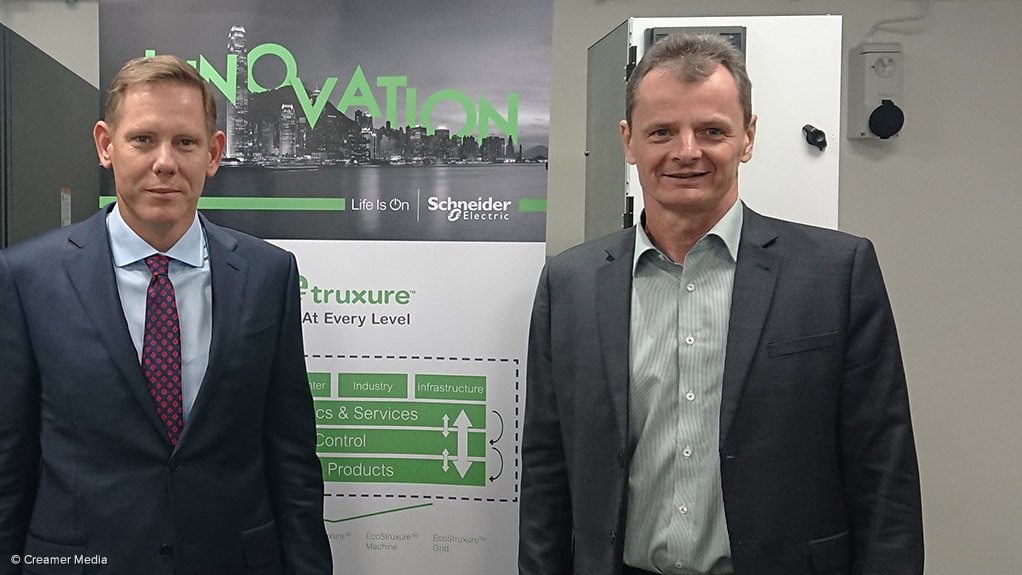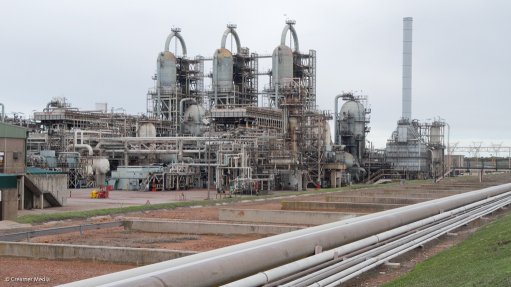Africa is opportune for energy, smart solutions development – Schneider Electric


Schneider Electric Middle East and Africa region president Casper Herzberg & Schneider Anglophone Africa cluster president Albert Fuchet
Photo by Marleny Arnoldi
Automation and energy management multinational Schneider Electric on Tuesday revealed its strategy for the African continent and how it relates to creating smart cities – taking cognisance of challenges and opportunities.
Schneider Electric Middle East and Africa president Casper Herzberg pointed out that energy demand outstrips supply in Africa and that there is insufficient electricity generation capacity, both in cities and rural areas, especially for industries.
This means that the African market is of paramount importance to the company, which Herzberg believes distinguishes the company from its competitors and other businesses in general.
Much of Schneider’s manufacturing and selling happens in Africa, which ensures an abundance of salespeople and facilities on the continent to facilitate the strategy. The company is especially active in South Africa, Kenya, Egypt and Nigeria.
“We are always looking for ways of doing more as this market grows,” Herzberg highlighted.
Since Africa is digitally leapfrogging, as seen with mobile phones, for example, and Herzberg anticipates it also happening with a general connected world.
“If you do not have legacy infrastructure, you tend to go immediately to the next point. This means that Africa, for the digital part of energy, is a huge opportunity and within that, data and data centres are crucial, which is an opportunity for Schneider’s information technology business, while benefiting African cities and businesses,” he maintained.
Another topic in Schneider’s Africa strategy is decentralisation – there is a trend in energy towards decentralisation, which means that energy is not only supplied by the utility, but also by, for example, businesses that have solar solutions in rural communities.
“It is an interesting market, since it also involves corporate social responsibility to aid communities that do not have access to electricity, and could provide opportunities for Schneider’s ‘access to energy’ solutions,” Herzberg noted.
He added that, in future, when solutions are scaled, it will create a challenge for the energy industry owing to the introduction of many offgrid players, which then increases the need for energy automation and for the software to manage energy – meaning that Africa could be a leader in energy automation.
“We see opportunities for our automation business and software that focuses on energy automation. We have traction with different African utilities, which are interested in implementing solutions that help them manage offgrid players and create energy stability.”
Further, in terms of Scheider’s strategy, Herzberg stated that, ultimately, Schneider comprises local companies globally that add to the bulk of its workforce, which is a different model from many other companies, where operations are centralised at a headquarters. “It is a local, but global culture.”
Therefore, within the company, there are avenues for people to grow in their countries and take global positions, especially coming from African operations.
“As the industry shifts from the traditional way of doing business to the digital way of doing business, and with Africa leading in this respect, we will create many digital talents on the continent,” Herzberg averred.
SMART CITIES
Within Africa, smart cities are a big challenge and an equally big opportunity, said Herzberg.
Digitisation entails connectivity across infrastructure and devices that were not previously connected, he explained, which offers many opportunities to make life in African cities better, especially in terms of water and energy management, as well as security and transportation.
The opportunities for a company such as Schneider could be to provide solutions that save African governments and businesses money on water and energy, since its systems can aid with minimising water and energy wastage, and it ultimately allows for better service delivery and perhaps connectivity for the public.
With fast-growing cities and greenfield developments, it is opportune to introduce smart city parks, with technology incorporated in the design phase, which makes it cheaper and more efficient to implement solutions, compared with trying to connect existing infrastructure.
Therefore, Africa’s undeveloped cities are challenging owing to a lack of basic infrastructure, but it does also create opportunity for start-up smart development, which is where Schneider will focus its efforts.
“The only thing that makes [energy automation and digitisation] difficult in Africa, is the distance of the continent and that Africa, as a set of economies, is one of the less economically integrated markets, compared to most other continents,” Herzberg highlighted, adding that challenges are present in any market globally.
African cities are already progressing towards smart connectivity. Herzberg pointed out that digital leapfrogging and the overall sentiment towards digitisation of business (which affects city life) is prominent in East Africa.
Egypt and South Africa is where most of the debate, effort and focus currently happens. However, he said it is difficult to compare and contrast, as there is no clear-cut smart African city at the moment.
Schneider Anglophone Africa cluster president Albert Fuchet commented that awareness is key. “Several times a year we present value propositions of smart cities at innovation summits, after which we often notice smart solutions or smart networks, as well as initiatives, popping up in various African cities.”
Leading the way in terms of smart cities are Barcelona, in Spain; Singapore, in Asia; Dubai, in the Middle East; and California, in the US.
Comments
Press Office
Announcements
What's On
Subscribe to improve your user experience...
Option 1 (equivalent of R125 a month):
Receive a weekly copy of Creamer Media's Engineering News & Mining Weekly magazine
(print copy for those in South Africa and e-magazine for those outside of South Africa)
Receive daily email newsletters
Access to full search results
Access archive of magazine back copies
Access to Projects in Progress
Access to ONE Research Report of your choice in PDF format
Option 2 (equivalent of R375 a month):
All benefits from Option 1
PLUS
Access to Creamer Media's Research Channel Africa for ALL Research Reports, in PDF format, on various industrial and mining sectors
including Electricity; Water; Energy Transition; Hydrogen; Roads, Rail and Ports; Coal; Gold; Platinum; Battery Metals; etc.
Already a subscriber?
Forgotten your password?
Receive weekly copy of Creamer Media's Engineering News & Mining Weekly magazine (print copy for those in South Africa and e-magazine for those outside of South Africa)
➕
Recieve daily email newsletters
➕
Access to full search results
➕
Access archive of magazine back copies
➕
Access to Projects in Progress
➕
Access to ONE Research Report of your choice in PDF format
RESEARCH CHANNEL AFRICA
R4500 (equivalent of R375 a month)
SUBSCRIBEAll benefits from Option 1
➕
Access to Creamer Media's Research Channel Africa for ALL Research Reports on various industrial and mining sectors, in PDF format, including on:
Electricity
➕
Water
➕
Energy Transition
➕
Hydrogen
➕
Roads, Rail and Ports
➕
Coal
➕
Gold
➕
Platinum
➕
Battery Metals
➕
etc.
Receive all benefits from Option 1 or Option 2 delivered to numerous people at your company
➕
Multiple User names and Passwords for simultaneous log-ins
➕
Intranet integration access to all in your organisation



















